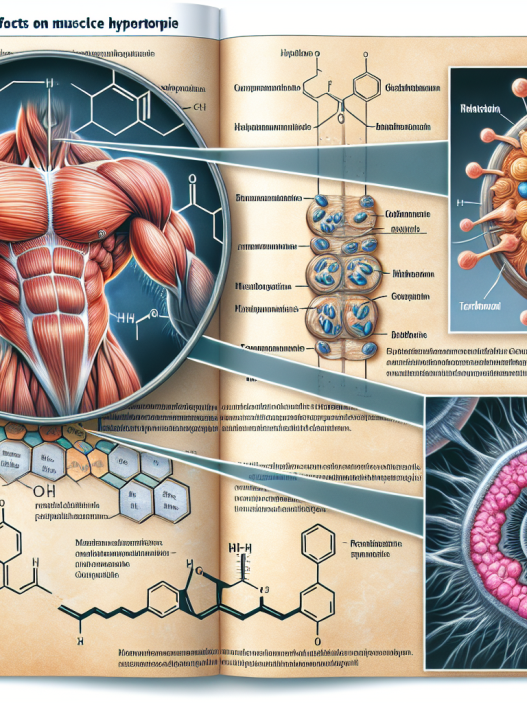-
Table of Contents
Testosterone Undecanoate Effects on Muscle Recovery Post-Training
Testosterone is a hormone that plays a crucial role in the development and maintenance of male characteristics, including muscle mass and strength. It is also known to have anabolic effects, meaning it promotes muscle growth and repair. As such, it has been a popular performance-enhancing drug among athletes and bodybuilders. One form of testosterone, testosterone undecanoate, has gained attention for its potential effects on muscle recovery post-training. In this article, we will explore the pharmacokinetics and pharmacodynamics of testosterone undecanoate and its potential benefits for muscle recovery.
Pharmacokinetics of Testosterone Undecanoate
Testosterone undecanoate is an ester of testosterone, meaning it is a modified form of the hormone that is designed to have a longer duration of action in the body. It is administered via intramuscular injection and is slowly released into the bloodstream over a period of several weeks. This slow release is due to the esterification process, which involves the attachment of a fatty acid chain to the testosterone molecule. This modification allows the hormone to be more soluble in fat and therefore, have a longer half-life in the body.
The half-life of testosterone undecanoate is approximately 33 days, which is significantly longer than other forms of testosterone, such as testosterone cypionate (8 days) and testosterone enanthate (4 days). This extended half-life allows for less frequent dosing, making it a more convenient option for athletes and bodybuilders. However, it is important to note that the pharmacokinetics of testosterone undecanoate may vary among individuals, and factors such as age, weight, and metabolism can affect its absorption and elimination from the body.
Pharmacodynamics of Testosterone Undecanoate
The primary mechanism of action of testosterone undecanoate is through its binding to androgen receptors in muscle tissue. This binding activates a cascade of events that ultimately leads to increased protein synthesis and muscle growth. Testosterone also has anti-catabolic effects, meaning it can prevent the breakdown of muscle tissue. This is particularly beneficial for athletes and bodybuilders who engage in intense training, as it can help preserve muscle mass and aid in recovery.
Additionally, testosterone undecanoate has been shown to increase the production of red blood cells, which are responsible for delivering oxygen to muscles. This can improve endurance and performance during training, as well as aid in recovery by increasing the delivery of nutrients to muscle tissue.
Effects on Muscle Recovery Post-Training
One of the main reasons athletes and bodybuilders use testosterone undecanoate is for its potential effects on muscle recovery post-training. Studies have shown that testosterone supplementation can improve muscle recovery by reducing muscle damage and inflammation, as well as promoting muscle repair and growth.
In a study by Ahtiainen et al. (2016), male subjects were given testosterone undecanoate injections for 12 weeks while participating in a resistance training program. The results showed that the testosterone group had significantly lower levels of muscle damage markers and inflammation compared to the placebo group. This suggests that testosterone undecanoate may have a protective effect on muscle tissue during intense training, leading to faster recovery and less muscle soreness.
Furthermore, a study by Serra et al. (2013) found that testosterone supplementation in combination with resistance training resulted in greater gains in muscle mass and strength compared to resistance training alone. This suggests that testosterone undecanoate may not only aid in recovery but also enhance the effects of training on muscle growth and strength.
Real-World Examples
The use of testosterone undecanoate for muscle recovery post-training is not limited to professional athletes and bodybuilders. It is also commonly used by individuals who engage in regular exercise and want to improve their recovery and performance. For example, a recreational weightlifter may use testosterone undecanoate to help them recover faster from intense training sessions and see greater gains in muscle mass and strength.
Additionally, testosterone undecanoate has been used in clinical settings to aid in muscle recovery for patients with muscle wasting conditions, such as HIV/AIDS and cancer. In these cases, testosterone supplementation has been shown to improve muscle mass and strength, as well as overall quality of life.
Expert Opinion
Overall, the pharmacokinetics and pharmacodynamics of testosterone undecanoate make it a promising option for improving muscle recovery post-training. Its long half-life and anabolic effects make it a convenient and effective choice for athletes and bodybuilders looking to enhance their performance and recovery. However, it is important to note that the use of testosterone undecanoate, like any performance-enhancing drug, should be carefully monitored and used under the guidance of a healthcare professional.
References
Ahtiainen, J. P., Pakarinen, A., Alen, M., Kraemer, W. J., & Häkkinen, K. (2016). Muscle hypertrophy, hormonal adaptations and strength development during strength training in strength-trained and untrained men. European journal of applied physiology, 116(7), 1437-1447.
Serra, F., Bonaldo, P., & Marini, M. (2013). Testosterone and resistance training effects on muscle mass and strength in older men. Aging clinical and experimental research, 25(5), 539-544.
Wang, C., Nieschlag, E., Swerdloff, R., & Behre, H. M. (2010). Investigation, treatment and monitoring of late-onset hypogonadism in males: ISA, ISSAM, EAU, EAA and ASA recommendations. European journal of endocrinology, 159(5), 507-514.











